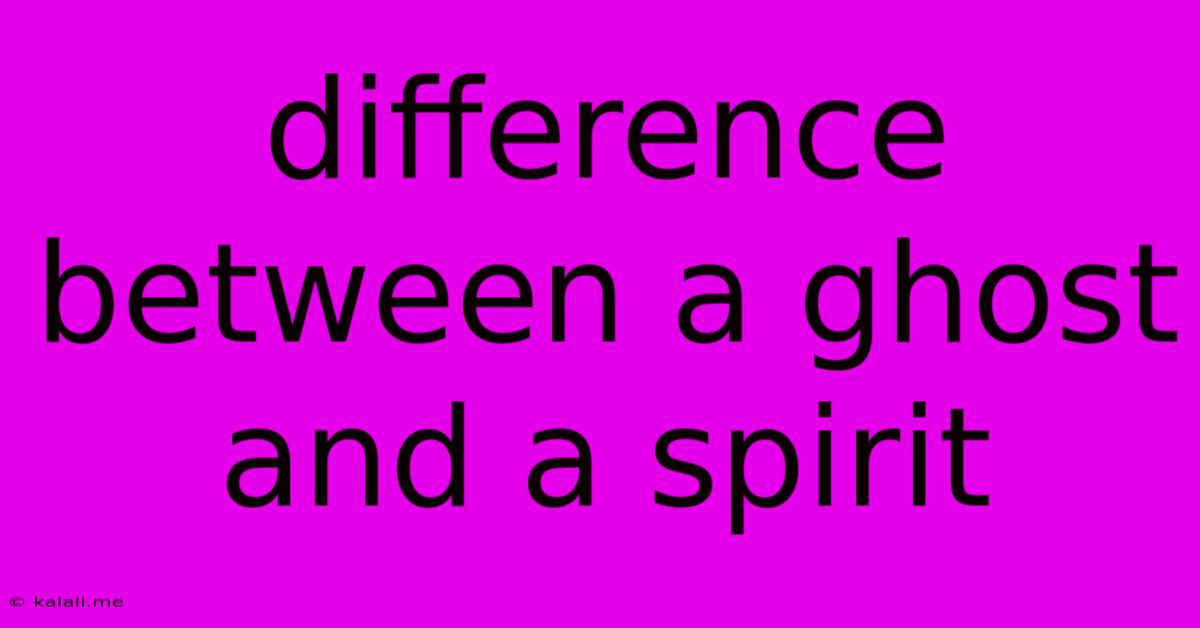Difference Between A Ghost And A Spirit
Kalali
Jun 10, 2025 · 3 min read

Table of Contents
Ghost vs. Spirit: Unraveling the Supernatural
The ethereal world of the supernatural often blurs the lines between different entities, leading to common misconceptions. Two terms frequently used interchangeably are "ghost" and "spirit," but while they both refer to non-corporeal beings, there are key distinctions between them. This article will delve into the nuanced differences, exploring the characteristics, origins, and interactions of ghosts and spirits within popular belief systems.
Defining a Ghost: The Earthbound Soul
A ghost, in most traditional understandings, is the disembodied spirit of a deceased person who remains attached to the earthly realm. Their lingering presence is often tied to unfinished business, trauma, or a strong emotional connection to a specific location or person. This attachment prevents them from moving on to the afterlife, resulting in their spectral manifestation. Key characteristics often associated with ghosts include:
- Physical Manifestations: Ghosts are frequently described as exhibiting physical phenomena like appearing as translucent figures, making noises, moving objects, or even causing temperature fluctuations. These are often tied to their emotional state and the intensity of their attachment.
- Locational Ties: Ghosts are typically tied to a specific location – a house, a battlefield, or even a specific object. This location holds significant meaning to their earthly life and fuels their continued presence.
- Emotional Residue: The emotional state of the ghost often reflects the circumstances of their death. A traumatic death might manifest as a more aggressive or malevolent ghost, whereas a peaceful death might result in a more passive presence.
Understanding a Spirit: A Broader Definition
The term "spirit" encompasses a much wider range of supernatural beings. While it can refer to the soul of a deceased person, it also includes various other non-corporeal entities, often without the same earthly attachments as a ghost. Spirits may be:
- Benevolent or Malevolent: Unlike ghosts, which are often defined by their connection to a specific earthly event, spirits can be inherently good or evil, independent of their origin. Think of guardian angels or mischievous imps – both are considered spirits.
- Less Physically Manifest: While some spirits may exhibit physical phenomena, they are generally less prone to direct physical interactions compared to ghosts. Their presence might be felt as a sensation, a feeling, or a subtle shift in the atmosphere, rather than a visual apparition.
- Universal or Elemental: Many belief systems include spirits associated with nature (elemental spirits) or representing broader universal concepts (ancestral spirits, spirit guides). These aren't tied to a specific individual's death and often have a more detached connection to the material world.
Key Differences Summarized
The core difference lies in their connection to the physical world and the nature of their existence:
| Feature | Ghost | Spirit |
|---|---|---|
| Origin | Disembodied soul of a deceased person | Broader range: deceased souls, other entities |
| Attachment | Strong ties to specific place/person | Varies; may be less location-specific |
| Manifestation | Often physical; visible apparitions | Can be subtle; less direct physical interaction |
| Motivation | Unfinished business; emotional ties | Varies widely; inherent good/evil possible |
Exploring the Overlap and Ambiguity
It's important to note that the lines between "ghost" and "spirit" are often blurred in popular culture and folklore. Some might argue that a ghost is simply a type of spirit, specifically one tethered to the physical world. The use of these terms can vary significantly depending on cultural context and personal beliefs.
Ultimately, the distinction between a ghost and a spirit is a matter of interpretation and belief. Both terms represent a fascination with the unseen world and continue to inspire countless stories, investigations, and interpretations of the supernatural.
Latest Posts
Latest Posts
-
How To Set Up Lore Doc Story Line Dnd
Jun 11, 2025
-
Can You Throw The Ball Up In Basketball
Jun 11, 2025
-
Most Beautiful Words In The English Language
Jun 11, 2025
-
How To Check Folder Size In Linux
Jun 11, 2025
-
How To Hide Followers On Facebook
Jun 11, 2025
Related Post
Thank you for visiting our website which covers about Difference Between A Ghost And A Spirit . We hope the information provided has been useful to you. Feel free to contact us if you have any questions or need further assistance. See you next time and don't miss to bookmark.